Case before Alabama Supreme Court could shut down fertility clinics, medical group warns
Justices on the Alabama Supreme Court heard oral arguments Tuesday in a wrongful death case against a Mobile fertility clinic involving the destruction of in vitro embryos stored in cryogenic freezers.
The case hinges on the argument that the state’s wrongful death statute should apply to embryos that have not yet been implanted in a woman’s uterus. Attorneys representing the Medical Association of the State of Alabama wrote that applying the wrongful death statute to in vitro embryos, which had been created in a lab but not yet implanted, would drive up the costs of fertility treatment and discourage doctors from practicing in Alabama.
“The potential detrimental impact on IVF treatment in Alabama cannot be overstated,” according to a brief filed by the Medical Association of the State of Alabama. “The increased exposure to wrongful death liability as advocated by the Appellants would – at best – substantially increase the costs associated with IVF. More ominously, the increased risk of legal exposure might result in Alabama’s fertility clinics shutting down and fertility specialists moving to other states to practice fertility medicine.”
Three families who sought fertility treatment at the Center for Reproductive Medicine in Mobile sued after an unauthorized person gained access to the cryogenic freezer and removed and destroyed unused embryos. The circuit court judge dismissed the case on the grounds that an embryo stored in vitro did not count as a person under Alabama law. The families appealed that dismissal and the case is now before the state supreme court.
Attorneys for the families, James and Emily LePage, William Tripp Fonde and Caroline Fonde and Felicia Burdick-Aysenne and Scott Aysenne, said Alabama law recognizes human life as beginning at the moment of conception, when sperm fertilizes an egg.
“This appeal presents this Court with the opportunity to lead the Nation … in proclaiming that all human life is precious from the moment of conception and that remedies do indeed exist for the wrongful deaths of human embryonic children,” according to the LePage brief.
The only difference between embryos implanted inside the body, which would be covered under Alabama’s wrongful death statute, and those stored in a cryogenic freezer is the location, they argued. Alabama voters approved a constitutional amendment in 2018 that protects the rights of unborn children.
Attorneys for the clinic argued that frozen embryos should not be covered under the wrongful death statute because they are not covered under the homicide statute or in other key parts of Alabama law. The destruction of the embryos happened when a patient from Infirmary Medical Center left another part of the hospital and walked into the cryogenic freezer area, which hadn’t been secured. After he dropped the frozen embryos, they couldn’t be saved, according to the brief. The person was not charged with murder.
Alabama has five clinics that perform advanced reproductive technology, which includes in vitro fertilization. An amicus brief filed by the Medical Association of the State of Alabama said many doctors retrieve multiple eggs for in vitro fertilization and create several embryos. That prevents women from having to undergo the surgical procedure multiple times for multiple children.
Parents pay to store unused embryos. But sometimes embryos are destroyed or donated for research if there are genetic problems or if they are unlikely to develop normally in utero, the medical association said. Requiring fertility clinics to store all unused embryos forever would push up the costs for patients.
“The Appellants’ position would require such embryos to remain in cryogenic storage even after the couple who underwent the IVF treatment have died and potentially even after the couple’s children, grandchildren, and even great grandchildren have died,” the medical association brief said. “This absurd result would be the outcome if this Court extends wrongful death liability to the destruction of cryopreserved embryos.”
Although fertility treatment has improved, failure rates still hover at around 50 percent for women who are young, raising the possibility of lawsuits for failed implantations.
“The Appellants’ position would result in physicians being potentially liable for wrongful death any time in vitro embryos fail to develop into a successful pregnancy,” the brief said.
Lawyers for the families argued that Alabama law has gone to great lengths to protect human embryos and fetuses, which should extend to lawsuits for wrongful death.
“Each embryonic child destroyed was special and unique,” the brief said. “Each human life destroyed can never be recreated. Each life taken has forever been lost to the Plaintiffs and the world. The fact that Plaintiffs may be able to conceive different children in the future is not a defense to killing the children Plaintiffs already conceived.”
